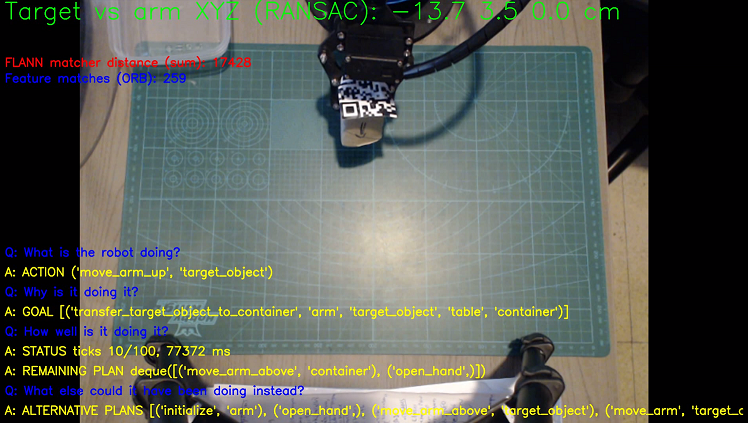Means-end, practical reasoning using Belief-Desire-Intention (BDI) architecture.
Demo: https://youtu.be/lO22-RkgV2Y
Presentation: https://1drv.ms/b/s!AgM7aH_rFcPzgrdkwJNIGvczvEBOaQ
Create a succeeding and a failing scenario, for a:
- Robotic arm manipulator.
- Carrying objects from a desk to a container.
Q: What is the robot doing? A: ACTION or FAILED
Q: Why is it doing it? A: GOAL
Q: How well is it doing it? A: STATUS & REMAINING PLAN
Q: What else could it have been doing instead? A: ALTERNATIVE PLANS
LewanSoul LeArm (60 gram servos, serial I/O):
- 6 degrees of freedom.
- Primitive control: servo positions in [500, 2500].
Wi-Fi 2.4GHz with ESP32 (Arduino compatible micro-controller):
- Restful API (GET/PUT) for servo position, speed and delay.
- Average Round Trip Time (RTT): 1-2ms (warmed, after 2 packets).
Logitech C920 camera for computer vision:
- 1920 x 1080 max resolution (3 MP), 30 max frames per second.
Object position detection (centimeter-level 3D detection of QR code) with partial obscuring (Python library: OpenCV):
- Oriented far and Rotated Brief (ORB) [RRKB11] feature detection.
- Fast Library for Approximate Nearest Neighbors (FLANN) [MM11] feature matching and homography perspective transformation.
- Pixels-to-XYZ: RANdom SAmple Consensus (RANSAC) [FB02].
- JSON in-memory nested data-structure for fast I/O.
- Hierarchical Task Network (HTN) [EHN94, GNT16]. Python library: pyhop.
- Arm: Forward and Inverse kinematic model.
- Gripper opening control: From centimeters 2 [0:5; 6:0] to servo value [500; 2500].
- Trajectories: Discretization of start and target position of end-effector.
- Collision avoidance: Knowledge-based on target object location, dimensions & action (i.e moveTo, moveUp, moveAbove etc).
- Events: From sensor percepts , to event firing.
BDI uses the Smart Python Agent Development Environment (SPADE) library:
- Real-time, behaviour-based agent model platform.
- Multi-Agent Instant Messaging (IM) and presence notification via:
- Extensible Messaging and Presence Protocol (XMPP).
- Foundation for Intelligent Physical Agents (FIPA) metadata and the Agent Communication Language (ACL).
- Asynchronous IO.
[BHW07] Rafael H. Bordini, Jomi Fred Hubner, and Michael Wooldridge. Programming Multi-Agent Systems in AgentSpeak using Jason. 2007.
[BIP88] Michael E. Bratman, David J. Israel, and Martha E. Pollack. Plans and resource and bounded practical reasoning. Computational Intelligence, 1988.
[BSSL19] Herman Bruyninckx, Christian Schlegel, Dennis Stampfer, and Alex Lotz. Composable, explainable and verifiable robotics and cyber-physical systems-of-systems: best practices and knowledge-based meta models for resilient holonic architectures. 2019.
[EHN94] Kutluhan Erol, James Hendler, and Dana S. Nau. Semantics for Hierarchical Task-Network Planning. Technical report, 1994.
[FB02] Martin A. Fischler and Robert C. Bolles. Random sample consensus: a paradigm for model fitting with applications to image analysis and automated cartography. Communications of the ACM, 2002.
[GNT16] Malik Ghallab, Dana Nau, and Paolo Traverso. Automated Planning and Acting. 2016.
[GPP+07] Michael Georgeff, Barney Pell, Martha Pollack, Milind Tambe, and Michael Wooldridge. The Belief-Desire-Intention Model of Agency. 2007.
[MM11] David G. Lowe Marius Muja. FAST APPROXIMATE NEAREST NEIGHBORS WITH AUTOMATIC ALGORITHM CONFIGURATION. 2011.
[RG97] Anand S. Rao Rao and Michael P. Georgeff. Modeling rational agents within a BDI-architecture. Readings in agents, 1997.
[RRKB11] Ethan Rublee, Vincent Rabaud, Kurt Konolige, and Gary Bradski. ORB: An efficient alternative to SIFT or SURF. In Proceedings of the IEEE International Conference on Computer Vision, 2011.
[Wei] Gerhard Weiss. Multiagent systems.
[Woo02] M. Wooldridge. Introduction to MultiAgent Systems. Information Retrieval, 2002.
Robotic Arm Copyright (c) 2018, Konstantinos Theodorakos (email: madks@hotmail.com). All rights reserved.
This program is free software; you can redistribute it and/or modify it under the terms of the GNU General Public License as published by the Free Software Foundation; either version 3 of the License, or (at your option) any later version.
This program is distributed in the hope that it will be useful, but WITHOUT ANY WARRANTY; without even the implied warranty of MERCHANTABILITY or FITNESS FOR A PARTICULAR PURPOSE. See the GNU General Public License for more details.
You should have received a copy of the GNU General Public License along with this program; if not, write to the Free Software Foundation, Inc., 51 Franklin Street, Fifth Floor, Boston, MA 02110-1301, USA.
